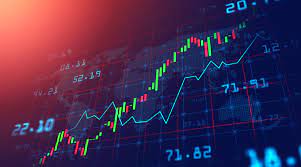In an increasingly interconnected world, online trading has become a dominant force in the financial markets. The rise of technology and the accessibility of the internet have democratized investment opportunities, allowing individuals from all walks of life to participate in the financial market. As we venture into the future, online trading continues to evolve, offering exciting possibilities and challenges.
1. The Power of Artificial Intelligence:
One of the most remarkable developments in online trading is the integration of artificial intelligence (AI) and machine learning algorithms. These technologies enable traders to make data-driven decisions, predict market trends, and automate trading processes. AI-driven trading bots are capable of analyzing vast amounts of data in real-time, making it easier for traders to capitalize on market fluctuations. This creates opportunities for both novice and seasoned traders to improve their strategies.
2. Social Trading Communities:
The rise of social trading communities is another fascinating development. These online platforms allow traders to interact, share insights, and even mimic the trading strategies of more experienced investors. Social trading not only promotes knowledge sharing but also fosters a sense of community among traders.
3. Cryptocurrencies and Decentralized Finance (DeFi):
Online trading has witnessed a dramatic shift towards cryptocurrencies and decentralized finance. The explosive growth of digital currencies like Bitcoin and Ethereum has created new and exciting avenues for investment. DeFi platforms, which eliminate traditional financial intermediaries, provide opportunities for peer-to-peer lending, yield farming, and liquidity provision. The decentralized nature of these platforms offers increased security and transparency.
4. Regulatory Challenges:
While online trading has made investing more accessible, it has also brought forth regulatory challenges. Governments and financial authorities worldwide are constantly adapting their regulations to address the risks associated with online trading. Traders should be aware of their local regulations and ensure they are trading on compliant platforms.
5. The Importance of Education:
As online trading becomes more sophisticated, education is crucial. Investors need to understand the markets they are trading in, the technologies they are using, and the risks involved. There is a growing demand for comprehensive educational resources, webinars, and tutorials to help traders make informed decisions.
In conclusion, online trading has come a long way, and its future is filled with promise and potential. With the integration of AI, the growth of social trading communities, the emergence of cryptocurrencies and DeFi, and the need for effective regulation and education, the landscape of online trading is evolving at an astonishing pace. Traders who adapt and stay informed will be best positioned to navigate this digital investment landscape successfully.
